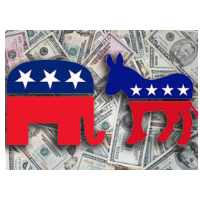GOP Leads the Charge to Kill State Campaign Finance Reform Measures
 (graphic: ProPublica)
(graphic: ProPublica)
It was a merry month of May for California campaign finance reform supporters when the state Senate passed four pieces of legislation inspired by a scandal over a secretive $11 million political contribution made in the heat of last year’s November election. The bills would have amended the Political Reform Act of 1974.
But the only one that made it to Governor Jerry Brown’s desk before the legislative session ended last week was the weakest of the bunch. The bills all required a two-thirds majority to pass and were, by and large, opposed by Republicans.
The one piece of legislation that survived, Senate Bill 3, was one of two bills, along with Senate Bill 2, which constituted the “Sunshine in Campaigns Act.” It requires extra training for campaign treasurers and orders a study to consider the possibility of replacing the state’s woefully lacking campaign finance information website.
Leading the hit parade of bills that didn’t pass both houses was Senate Bill 52, which was approved by the Senate in May but never came up for a vote in the Assembly. The California Disclose Act would have required that the top three donors to a political advertisement be openly identified on the campaign website or in the ad. It also would have forced disclosure for issue-advocacy advertisements, which may not directly support/condemn a candidate running for office, but can potentially influence voter choice.
Nine of the 11 “no” votes in the Senate were cast by Republicans.
Senate Bill 2 and Senate Bill 27 each passed the Senate in May but never got a vote on the Assembly floor. SB2 would have required candidates to verbally approve any coordinated elections communications. SB27, line SB52, took aim at the problem of “dark money” and would have required disclosure of individuals behind donations to political campaigns even if they came from 501(c) nonprofit groups.
All but one of the “no” votes in the Senate for SB 2, and all eight for SB27, were cast by Republicans.
Additional pieces of election law legislation were introduced during the legislative session. Assembly Bill 914 passed the Assembly in May but never got a floor vote in the Senate. It would have instituted disclosure regulations for 501(c) nonprofit organizations spending in excess of $50,000 in a given year.
Assembly Bill 800 passed the Senate but failed in the Assembly by one vote. It would have given the Fair Political Practices Commission (FPPC) more power to investigate campaign irregularities before an election is over, but received no support from Republicans.
According to the Los Angeles Times, GOP members cited, as a reason for their vote, discredited allegations—still popular among right-wing pundits and politicos—that the Internal Revenue Service (IRS) had misused its powers and persecuted Republicans political groups in the run-up to last year’s national election.
–Ken Broder
To Learn More:
Campaign Finance Bills Fare Poorly in California Legislature (by Chris Megerian and Melanie Mason, Los Angeles Times)
Assembly Passes Bills Reshaping California Campaign Ethics (by Alex Gauthier, Independent Voter Network)
California Campaign Finance Reform Bills Pass Senate (by Alex Gauthier, Independent Voter Network)
FPPC Solidifies Stance on Campaign Finance Bills (by Jeremy B. White, Sacramento Bee)
- Top Stories
- Controversies
- Where is the Money Going?
- California and the Nation
- Appointments and Resignations
- Unusual News
- Latest News
- California Forbids U.S. Immigration Agents from Pretending to be Police
- California Lawmakers Urged to Strip “Self-Dealing” Tax Board of Its Duties
- Big Oil’s Grip on California
- Santa Cruz Police See Homeland Security Betrayal in Use of Gang Roundup as Cover for Immigration Raid
- Oil Companies Face Deadline to Stop Polluting California Groundwater





